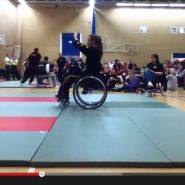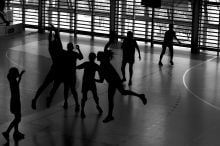There have been many different views on the importance of PE but one message is clear and underpins the majority of opinions, and it is that PE is fundamental in a child’s physical, social and cognitive development.
If we want to build on the success of the London 2012 Olympics and continue the British sporting legacy it is vital that PE teachers strive to raise the participation of young people taking part in physical activity and competitive sport by ensuring the delivery of high quality PE and sport within the curriculum.
In order to deliver outstanding PE and sports provision, planning active and engaging lessons is paramount.
Lesson planning that will effectively reach goals and learning objectives is an important step in raising PE attainment and participation in physical activity and sport. Lesson planning is also a time that a teacher can show their creativity and innovation, inspiring and engaging students in PE.
According to OFSTED, outstanding PE lessons should include the following elements:
- Differentiation for various groups of learners so that all abilities of learners are suitably challenged
- Activities that engage and motivate students
- Activities that develop independent and resilient learners
- Assessment as part of developing progress for learning
- Effective collaborative learning and peer review
- Effective classroom and behaviour management
From my own experiences, I have found that outstanding lessons start with outstanding planning and that many of the ingredients outlined by OFSTED, and needed for delivering outstanding lessons, can be achieved through effective planning.
For example, it is important that the teacher knows their learners and understand their capabilities. In order for all students to make progress it is vital that all students are challenged regardless of their ability and therefore suitable activities and progressions are planned for all groups of learners.
In order for learners to understand their progress, assessment for learning is an important strategy that can be used to assess pupil progress and allow teachers and pupils to determine a starting point in their learning. Assessment for learning is a strategy that if planned effectively can be useful in allowing students to take control and responsibility of their own learning – through self assessment students can become independent and resilient learners.
Assessment for learning can also be used to develop collaborative learning through the use of peer feedback and assessment. Both strategies can be used as an effective tool for students to understand the progress they have made, need to make or how to make it. It could be suggested that students who set themselves clear targets and understand the route to reach their goals would be more motivated and engaged in their learning.
Assessment for learning can be used in many ways but, if used successfully, allows for effective differentiation by the teacher being able to plan specific activities for specific groups of learners, identified by assessment.
For example, how does the teacher deliver an outstanding lesson, ensuring all students make good to outstanding progress, to a class of students ranging in ability from the elite athletes to students with special educational needs? In order to actively engage all students it is important to be aware of high attaining, middle attaining and low attaining learners and plan suitably differentiated activities for each ability group.
If differentiation is used effectively it could be suggested that most of the remaining outstanding ingredients outlined by OFSTED will fall into place. If activities are differentiated to suit all learners needs then from, my own personal experience, learners are engaged, motivated and therefore all make excellent progress. I have also found from that if students are actively engaged and inspired by lessons there is little or no need for behaviour management.
Inadequate planning can have a detrimental effect on pupil attainment as well as their development as a sports performer. It could be argued that poor planning can disengage students from PE – decreasing the number of students being physical active outside of the classroom. If fewer students are being physically active or not competing in competitive sport then the nation’s sporting legacy is at risk of diminishing.
Outstanding PE curriculum provision is the key to getting children ‘hooked’ on sport and into physical activity. High quality and effectively planned PE lessons inspire pupils to pursue physical activity and competitive sport outside of the curriculum either as part of the school sport enrichment programme or at external sports clubs.
Outstanding PE and sports provision starts with effective classroom planning ensuring that every child matters, every child makes progress and that every child has the opportunity to succeed in sport whatever that level might be, regardless of their ability.
Lee Holmes is the Head of PE at Castleford Academy in West Yorkshire.










